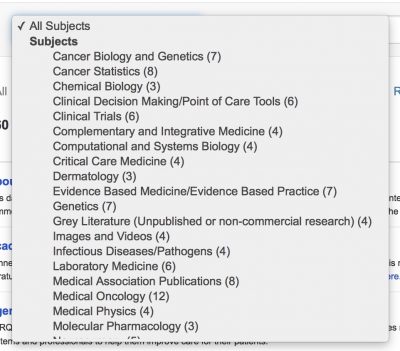Explore the MSK Library’s redesigned A-Z Databases list!
Last year our old alphabetical database list got a makeover and now it’s easy to search and browse for the perfect database for your specific needs.
Our databases can always be browsed alphabetically, but now they can also be browsed by subject area and found by keyword search!

![]()
Once you identify the database you want to search, the link will take you directly to that database – remember, if you are working remotely be sure to log into Remote Access first – or you can “share” the database by selecting the ![]() icon, which allows you to copy the permalink to the database as well as send the URL to yours or someone else’s email.
icon, which allows you to copy the permalink to the database as well as send the URL to yours or someone else’s email.

The Database page is linked to the Help page but you can always contact the Library with questions about this page as well as for assistance with database selection and searching.